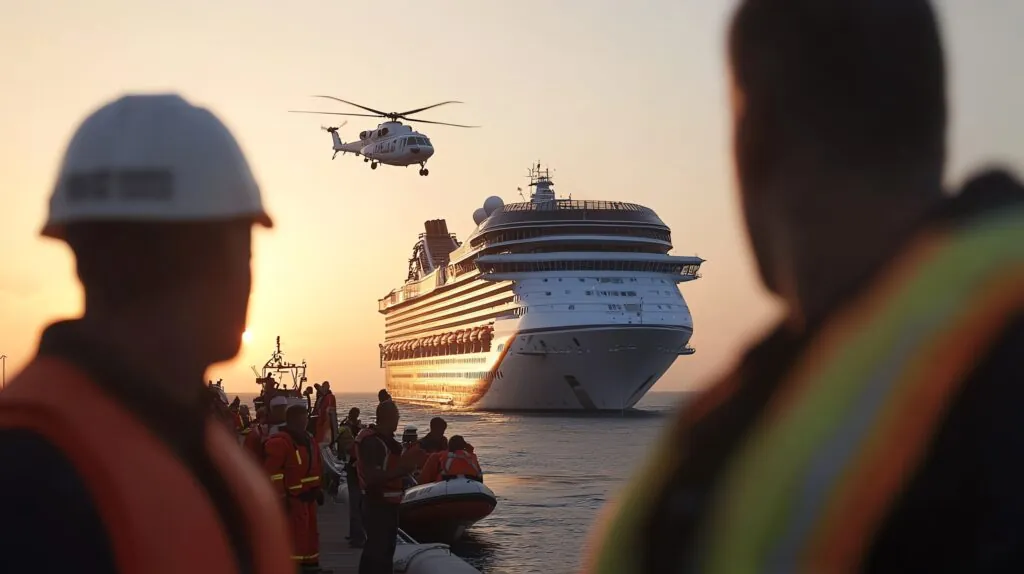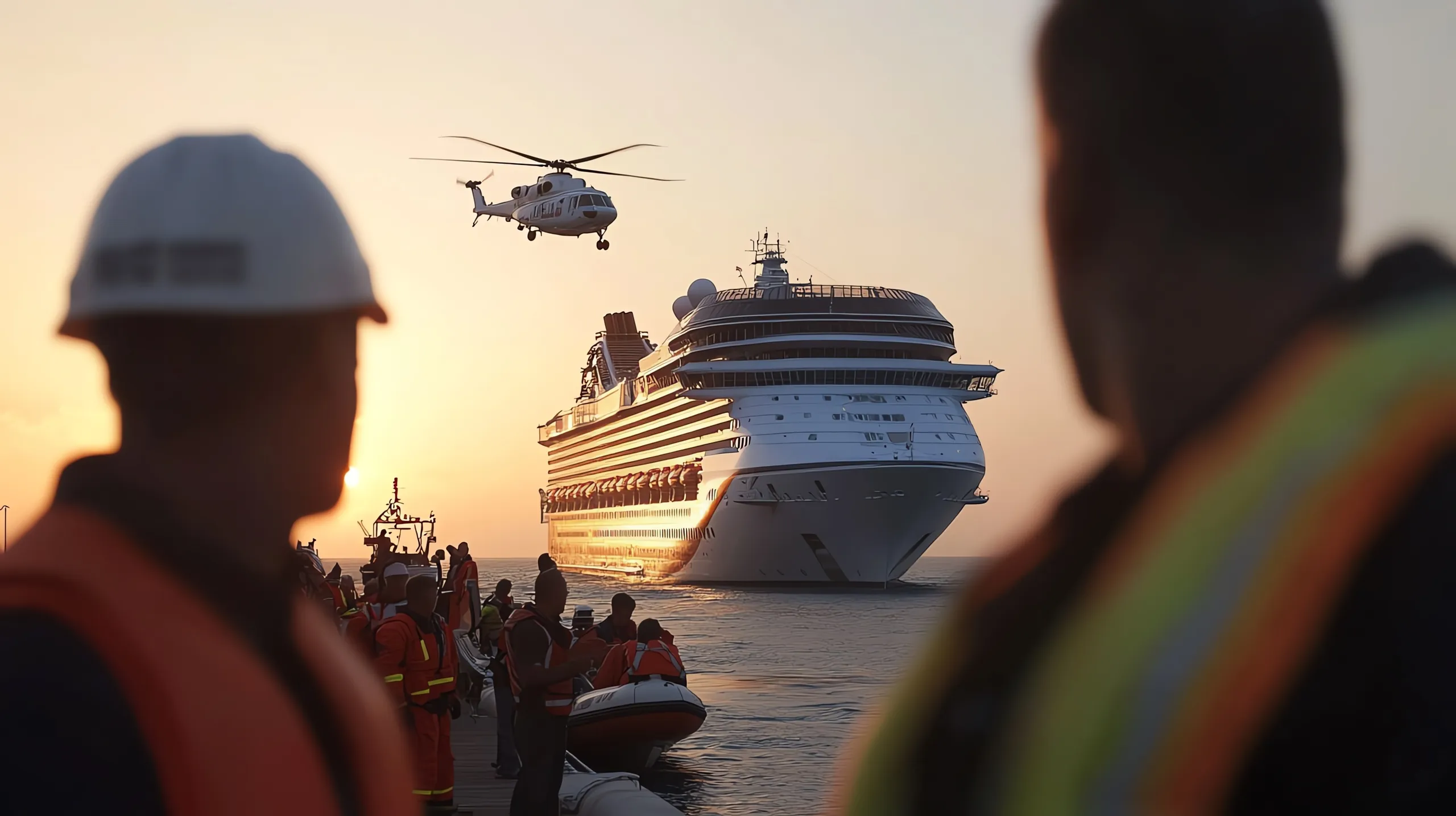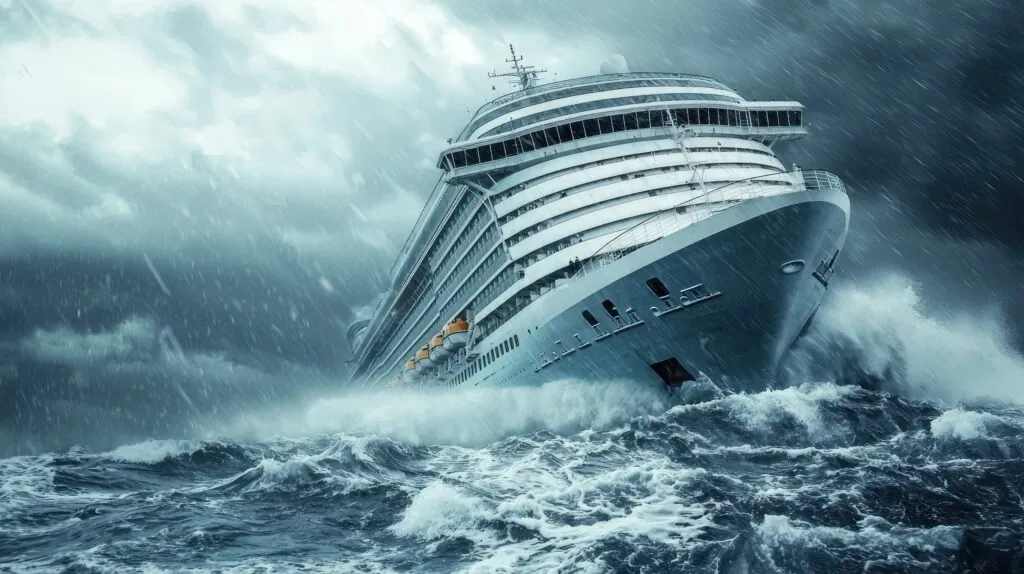Are Cruise Lines Liable for Negligent Emergency Evacuations?
Protecting Your Rights After Cruise Ship Incidents
At The Cruise Injury Law Firm, we are dedicated to helping cruise ship passengers who have been injured due to cruise line negligence, especially during emergency evacuations at sea. A cruise vacation should be a time of relaxation and enjoyment. However, when safety protocols are neglected or evacuation procedures are mishandled, the consequences can be catastrophic and life-altering.
Our experienced maritime attorneys specialize in holding cruise lines accountable when they fail to protect their passengers. Whether you’ve been injured during an evacuation, faced unsafe conditions on board, or experienced psychological trauma from a chaotic emergency, we are here to provide the legal support you need.

Understanding Cruise Line Liability
What Is Cruise Line Liability?
Cruise line liability refers to the legal responsibility that cruise operators have to ensure the safety and well-being of their passengers. This duty of care encompasses maintaining a safe environment, conducting regular safety drills, keeping emergency equipment functional, and training crew members to respond efficiently in crises.
Why Do Cruise Lines Have a Duty of Care?
Cruise lines are legally obligated to protect their passengers under both maritime law and international safety regulations. This means they must take proactive steps to minimize risks, properly maintain safety equipment, and train their staff to manage emergency situations responsibly.
Common Situations Leading to Cruise Line Liability
1. Failure to Safely Evacuate Passengers
One of the most critical situations is the failure to evacuate passengers safely. When cruise lines mishandle evacuations, it can result in injuries, fatalities, or severe emotional trauma.
2. Poor Maintenance of Safety Equipment
Safety equipment, such as lifeboats and life vests, must be functional and readily accessible. When this equipment fails during an emergency, it can lead to severe injuries or fatalities.
3. Inadequate Crew Training
Crew members must be adequately trained to handle emergencies efficiently and calmly. When staff are unprepared or unqualified to guide passengers during a crisis, chaos and injuries can occur.
4. Negligence in Safety Protocols
Cruise lines must conduct regular safety drills and provide clear evacuation instructions. Negligence in these areas can significantly increase the risk of harm during an emergency.
5. Environmental Hazards on Board
Slippery decks, faulty barriers, and unsecured objects can become hazardous during evacuations. These conditions can lead to slip and fall accidents, head injuries, or being struck by falling objects.
How We Prove Liability
1. Gathering Evidence
Our legal team meticulously collects safety records, maintenance logs, crew training documents, and eyewitness testimonies. This evidence helps us build a strong case demonstrating the cruise line’s negligence.
2. Working with Experts
We collaborate with maritime safety experts to analyze whether the cruise line followed established safety standards. Their insights help reinforce our argument that the cruise line failed to meet its duty of care.
3. Building Your Legal Case
We develop a compelling narrative linking the cruise line’s failure directly to the injuries you sustained. This includes presenting documentation, expert testimonies, and eyewitness accounts to support your claim.
Emergency Evacuation at Sea: Your Legal Rights
What Are Your Rights During an Emergency Evacuation?
You have the right to be evacuated safely and promptly. Cruise lines are required to perform evacuations without unnecessary delays, following pre-established safety protocols.
Receiving Clear and Accurate Instructions
Passengers have the right to receive clear guidance about how to proceed during an evacuation. This includes information on where to assemble, how to wear life-saving equipment, and what to expect during the process.
Access to Functional Safety Equipment
Safety equipment such as life jackets, lifeboats, and evacuation slides must be maintained in good condition and readily accessible. Malfunctioning or missing equipment can significantly increase the risk of injury.
Properly Trained Staff
Crew members must be adequately trained to manage evacuations efficiently and calmly. Passengers should expect professional guidance during emergencies, including help with wearing life jackets and finding safe exit routes.
Access to Medical Assistance
If injuries occur during the evacuation process, cruise lines are required to provide medical care. This includes first aid and, if necessary, emergency transport to medical facilities.
Common Injuries Sustained During Cruise Ship Emergencies
Physical Injuries During Evacuations
Physical injuries can range from minor bruises to life-threatening trauma. Common injuries include:
- Slip and Fall Injuries: Caused by wet or slippery decks, leading to fractures or head injuries.
- Crush Injuries: Occur when passengers are trampled or pinned during chaotic evacuations.
- Drowning or Near-Drowning: Resulting from faulty life jackets or improperly deployed lifeboats.
- Burns and Smoke Inhalation: Often occur during onboard fires, causing severe burns and respiratory issues.
- Lacerations and Bruising: Due to broken glass or unsecured items during emergencies.
Psychological and Emotional Injuries
The trauma of a poorly managed evacuation can lead to significant psychological issues, including:
- Post-Traumatic Stress Disorder (PTSD): Triggered by the fear and chaos experienced during an emergency.
- Anxiety and Panic Disorders: Resulting from the fear of injury or death.
- Emotional Distress: Ongoing stress and mental anguish caused by recalling the incident.
Compensation You May Be Entitled To
1. Medical Expenses and Rehabilitation Costs
Compensation may include hospital bills, surgeries, physical therapy, and ongoing medical care related to your injuries. Psychological counseling for trauma-related disorders is also covered.
2. Lost Wages and Reduced Earning Capacity
If your injuries prevent you from working, you may receive compensation for lost wages. If you cannot return to your previous occupation, you may also be eligible for loss of future earnings.
3. Pain and Suffering
This compensation covers both the physical pain endured and the emotional distress resulting from the incident. Pain and suffering are often significant components of personal injury claims.
4. Loss of Enjoyment of Life
Injuries that reduce your ability to participate in hobbies, social activities, or daily routines can result in compensation for loss of enjoyment.
5. Punitive Damages for Gross Negligence
If the cruise line’s conduct was particularly reckless, punitive damages may be awarded to punish the wrongdoing and deter similar negligence in the future.
6. Wrongful Death Compensation
In the event of a fatality, surviving family members may claim compensation for funeral expenses, loss of companionship, and financial support.
Why Choose The Cruise Injury Law Firm?
Expertise in Maritime Law
Our firm specializes in cruise injury cases, giving us a deep understanding of maritime regulations and legal complexities.
Client-Centered Approach
We treat each case with compassion and dedication, understanding the physical and emotional toll of cruise-related injuries.
Successful Track Record
We have a proven history of recovering compensation for clients affected by cruise line negligence. Our attorneys are skilled negotiators and fierce litigators.
No Upfront Costs
We work on a contingency basis, meaning you pay nothing unless we win your case.
Frequently Asked Questions (FAQs)
What should I do immediately after a cruise ship injury?
If you are injured on a cruise ship, the first thing you should do is seek medical attention. Cruise ships usually have medical staff on board who can provide initial treatment. After receiving care, report the incident to the ship’s staff or management and ensure that an official accident report is created. Try to collect evidence such as photographs of the scene, witness statements, and any documentation related to your injury. Contacting a maritime lawyer as soon as possible is also important to understand your rights and the next steps.
Can I sue a cruise line for an injury sustained during an evacuation?
Yes, you can sue a cruise line if your injury resulted from their negligence during an evacuation. Cruise lines have a duty to ensure safe evacuation procedures, properly train their staff, and maintain functional safety equipment. If the evacuation was mishandled or poorly executed, and this led to your injury, you may have grounds for a personal injury lawsuit. Our legal team can help evaluate your case and determine the best course of action.
What types of compensation can I recover after a cruise ship injury?
You may be entitled to compensation for medical expenses, including hospital stays, surgeries, rehabilitation, and ongoing care. Compensation for lost wages or loss of earning capacity may also be available if your injury prevents you from working. Additionally, you can seek damages for pain and suffering, which includes both physical pain and emotional distress. In cases where negligence was particularly severe, punitive damages may be pursued to hold the cruise line accountable. If the injury resulted in a fatality, surviving family members might be eligible for wrongful death compensation.
How do I prove that the cruise line was negligent?
Proving negligence involves demonstrating four key elements. First, we must establish that the cruise line owed you a duty of care, which is a legal obligation to ensure your safety. Next, we show that the cruise line breached this duty by failing to follow safety protocols, maintain equipment, or properly train staff. Then, we need to prove causation, linking the breach directly to your injury. Finally, we document the damages you suffered, including medical expenses, lost income, and emotional distress. Our attorneys gather evidence, interview witnesses, and consult with experts to build a strong case.
How long do I have to file a claim after a cruise ship injury?
The time limit to file a claim, known as the statute of limitations, varies depending on the nature of the injury and the cruise line’s terms and conditions. Typically, maritime law allows a one to three-year period to file personal injury claims. However, some cruise lines include clauses in their passenger contracts that shorten this period to as little as six months. It is essential to act quickly and consult with a maritime lawyer who can review your case and ensure that your claim is filed on time.
Contact The Cruise Injury Law Firm Today
If you or a loved one has been injured during a cruise ship evacuation or suffered due to cruise line negligence, don’t hesitate to seek legal assistance. Contact The Cruise Injury Law Firm today for a free, confidential consultation.
Our dedicated maritime lawyers are here to protect your rights, hold negligent cruise lines accountable, and secure the compensation you deserve. Let us help you navigate the legal process and rebuild your life after a traumatic incident.






